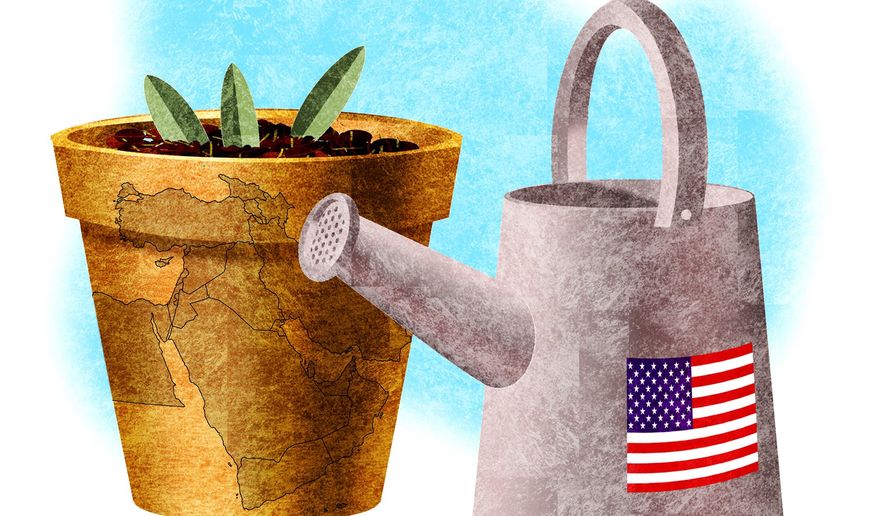Cultivating economic and diplomatic partnerships can balance a smaller military footprint.
The recently reported economic and security partnership proposal between China and Iran, worth $400 billion over 25 years, should trigger Washington to reassess its own commitments in the Middle East. A more balanced strategy in the region would prioritize economic and diplomatic partnerships that strengthen the security of regional friends and U.S. national security at home.
In the past year, America has decreased the number of troops it has in Afghanistan and Syria, with ongoing talks to do the same in Iraq. Both presidential candidates favor winding down existing military commitments to focus on Asia, a sentiment that the spread of COVID-19 will strengthen.
The State Department has already spent roughly $190 million on COVID-19 assistance throughout the Middle East. Yet, the “America First” doctrine suffers from a lack of engagement, leadership and diplomacy. This has led to a decline in global influence as allies doubt America’s commitments and increasingly build ties with China and Russia. Now, America is less secure and able to deal with global challenges.
COVID-19 presents a possible opportunity to rebuild America’s global standing, particularly with Middle Eastern states that seek funds to alleviate their hurting oil and tourism industries. The International Monetary Fund (IMF) predicts that Middle East oil will provide $270 billion less revenue than last year and a 7.3% overall economic contraction in these states.
U.S. grants or loans to Arab Persian Gulf states could alleviate this, but American leaders could also use the program as a carrot to encourage further backchannel talks with Israel over their mutual concerns about Iran. American investment would have the added benefit of replacing Chinese ventures in critical infrastructure that might give Beijing intelligence access in these countries.
To be sure, the United States has its own health and economic problems right now. The rate of coronavirus cases and deaths continues to rise, and much of the country’s economy is still shut down. Despite these challenges, Washington should avoid any reductions in foreign aid, which only amounts to roughly 1% of the federal budget every year. Additionally, U.S. officials can leverage influence with the IMF and World Bank, which adds no new costs to Americans.
Nowhere is U.S. aid more important than in Iraq. Newly appointed Prime Minister Mustafa al-Kadhimi has begun cracking down on Iranian proxies, including those that have killed Americans. However, taking a more offensive posture will be a tremendous challenge because of Iranian political influence and the country’s deep economic woes.
As U.S. Central Commander Frank McKenzie recently said after visiting with PM Kadhimi, “he’s negotiating a land mine now. I think we need to help him.” Indeed, the collapse of Iraq’s political or economic systems would be a breeding ground for jihadist and pro-Iranian sentiment. American aid programs could bolster the prime minister’s domestic support, giving him more latitude to move against those damaging his country.
Meanwhile, the United States has increasingly relied on Israel, a state that takes pride in the ability to defend itself by itself, as critically important to holding Iranian influence in the region in check. Israeli airstrikes targeting Iranian weapons in Syria, Lebanon and even as far as Iraq have had the greatest success waging low-intensity conflict against Iran’s military.
A narrow U.S.-Israel mutual defense pact could strengthen deterrence against Iran by solidifying U.S. commitment to respond if Israelis faced an exceptional attack that put the country in extreme peril. Unlike the public debate about NATO members spending more on their own defense, the U.S.-Israel treaty itself would not create new funding or basing burdens.
During the Cold War, the United States tackled similar limitations on its ability to use unilateral force through programs like the Marshall Plan to reconstruct war-torn Western Europe and the establishment of NATO, its most important military alliance. These initiatives promoted financial and security assurances that Western Europe would not fall under Soviet sway.
During the decade after World War II, foreign aid was just over 1% of annual GDP, but it fell to between .2% and .4% for much of the post-Cold War period. Now that the American public and political leadership lack interest in using military force in the Middle East, the United States must flex economic and diplomatic muscles that have atrophied from underuse.
These changes will take time but would cement a more constant and lower-cost American commitment to the region. However, the United States needs to expand economic and diplomatic partnerships now or risk setbacks that could last decades.
William J. Bender, a retired U.S. Air Force lieutenant general, is a former Air Force chief information officer and a participant of the Jewish Institute for National Security of America’s (JINSA) 2019 Generals and Admirals program to Israel. Ari Cicurel is senior policy analyst at JINSA’s Gemunder Center for Defense & Strategy.
Originally published in Washington Times

